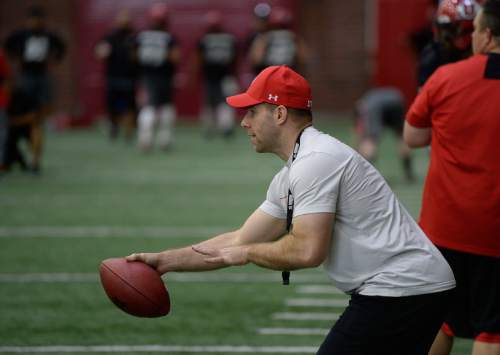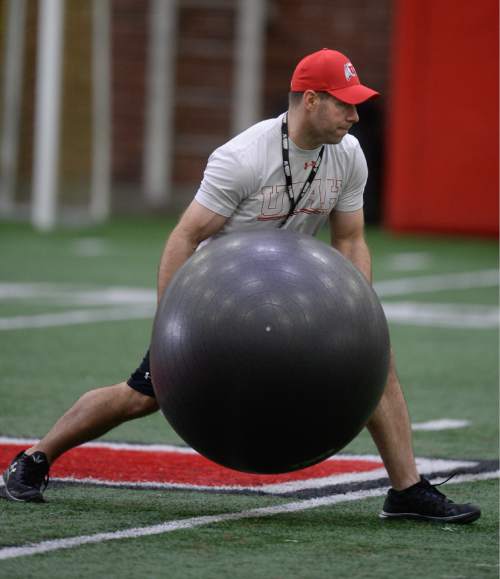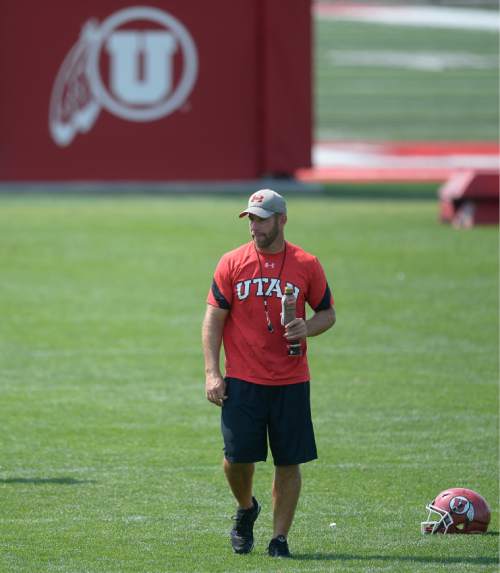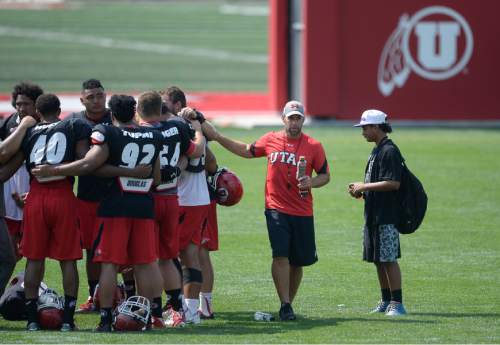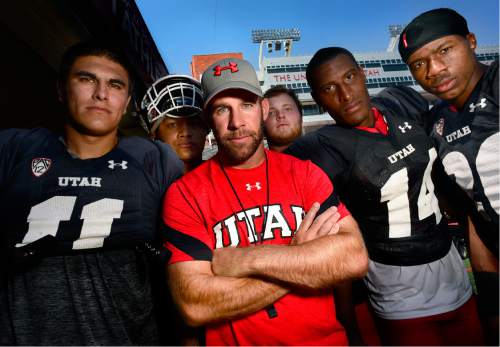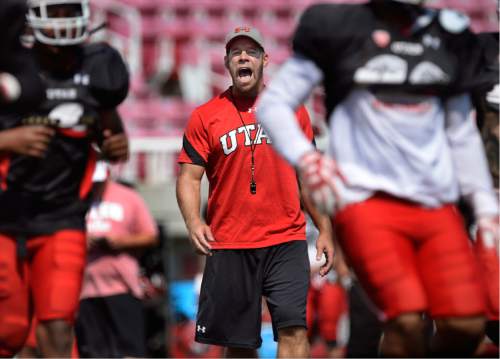This is an archived article that was published on sltrib.com in 2016, and information in the article may be outdated. It is provided only for personal research purposes and may not be reprinted.
He's taking his hard knocks now in NFL training camp, but so far, the toughest night Jared Goff ever had on a football field was at Rice-Eccles Stadium last October.
The man who would be the first overall NFL draft pick the next year couldn't stop throwing to the other team. With a career-high five picks against the Utes, the Cal quarterback fell back to earth in a 30-24 win for the home team. He never threw more than two interceptions in any other game.
That victory — in front of a sold-out home crowd — rightly belongs to the players who picked off those passes: Gionni Paul, Marcus Williams and Justin Thomas. It belongs to Dominique Hatfield, who had a pair of interceptions.
But the man pulling the strings of Utah's secondary that night, the architect behind the grand plan that flummoxed the top-rated quarterback in college football: That was Morgan Scalley.
"People always say it's [Kyle Whittingham's] defense, and basically, they're right," former defensive coordinator John Pease said. "But the misdirection, the disguises, the innuendo and bringing guys out of the box — that's Morgan."
By now, Scalley's stubbled, firm-jawed mug is a familiar one to Utah fans, both those who know him as the hard-hitting safety from Highland High School who was a leader on the 2004 Fiesta Bowl team, or those who know him more recently as one of Utah's young coaches. This year, the 36-year-old has taken on a role for which he's been long groomed: defensive coordinator.
On the practice field, the shift has been a subtle one. There's no great schematic or organizational shifts — Scalley is as much apart of the fabric of the program as the turf on which he sweats and shouts. But even before the Utes kick off a game, it's clear to those within the program that he's as prepared as anyone who has ever taken the job, and he started putting his stamp on the vaunted Utah defense long before he took its reins.
"The most important thing is he hasn't missed a beat," coach Kyle Whittingham said. "No drop-off in effort, intensity, focus and concentration. He's got those guys playing hard, and that's 90 percent of it."
As a player, that effort and intensity defined Scalley. When Urban Meyer arrived in 2003, he quickly learned that if there was a problem with a player — someone was missing class, or wasn't getting in the film room — Scalley was a teammate who would fix it.
He was a coach's dream in every way: the conference defensive player of the year on the field, and a 3.96 GPA student off of it. Weber State coach Jay Hill, who was a graduate assistant when Scalley was a player, said Scalley's self-motivation was unique.
"When Morgan made a mistake, Urban wasn't really extra hard on him," Hill said. "You knew Morgan was already going to be hard on himself."
What stood out then was also what stands out now: Scalley is a stickler for being prepared and organized. That plays into how he studies game film and notices tendencies, but also how he recruits. Hill recalled seeing pages and pages of information Scalley would collect before recruiting visits, more than anyone else on staff.
Similarly, he forces players to try to rise to his level. At the beginning of defensive meetings, Scalley will often post questions about situational football on the meeting room board and call out individual players to answer them. Those who don't want to be publicly stumped had better study their playbooks.
"He wants all of his defensive players to be the smartest players on the field," cornerbacks coach Sharrieff Shah said. "Scalley says it all the time: 'I didn't run 4.3, I wasn't the biggest, but I put myself in position to make plays by being smart.'"
Scalley's smarts have been a tool for the coaching staff since he joined 10 years ago. Always a film rat, he built credibility as a coach for studying tendencies.
Against UCLA in 2011, Scalley suggested the staff install a safety blitz that would require leaving a tight end uncovered. Not all the coaches were on board, Hill said, but the play was called in the game, resulting in a sack by Eric Rowe.
In another game against Oregon State, the Utes faced third and short. Scalley had noted one of the Beavers tendencies, shallow crossing routes, and determined that a Cover 2 would stop them in that situation. Right before the snap, Whittingham asked then-defensive coordinator Kalani Sitake why they were running the scheme.
"Kalani said, 'Hey, it's OK, Morgan scouted it out,'" Hill said. "So they ran the play, they didn't get [a first down]. Those were some of the moments early in Morgan's career when Kyle really started to trust him."
When Sitake left after the 2014 season, many observers figured Scalley's time to ascend had arrived. But Whittingham, still wanting to wait to give him the nod, surprised by pulling Pease out of retirement.
While his colleagues said Scalley never let it show at work, he was disappointed.
But one of the first calls he got was from Pease, who called to tell him about how he was passed up three times in his NFL career for a defensive coordinator job before he finally got one.
"I told him, 'If you learn something from me, I'm 72 and not going to be around forever,'" Pease said. "You will be the guy. I think he knew that. That's probably a credit to how smart he is."
By many accounts, Scalley learned a lot in that year, which he later called "invaluable."
He coached up in the box and learned how to place some emotional distance between himself and what was happening on the field. He grew his knowledge base, including some tricks of Pease's NFL tenure.
This past offseason, it was natural for Pease to retire, and for Scalley to assume the role he's long been slated for.
"Not only did it teach him patience, but it was amazing to learn from Coach Pease," said Shah. "It's something to have now, to be able for Morgan to keep that calm while still having a motivational edge."
The transition has been smooth. Scalley shouts less on the field than he used to — Pease said he's become "more of an assassin, more selective with it." He's left a part of the exuberant, emotional player behind to become the grounded, confident coach.
Players say it suits him.
"He's like a father on the field: Tells you the things you need to be doing, and makes you feel comfortable on the field," junior safety Marcus Williams said. "He encourages me. He never gets me down. He just keeps me grinding."
Scalley, too, will continue to grind. That's what's gotten him here. He's not changing now.
"I love Utah, I want to stay here, I've always loved it here," he said. "As long as we keep doing what we're doing, it will bear out."
Twitter: @kylegoon —
Morgan Scalley is Mr. Utah
• Born in Salt Lake City, and attended to Highland High
• Four-year letterman as a safety and returner for the Utes
• 2004 co-Mountain West defensive player of the year and second-team AP All-America
• Captain on 2004 12-0 Fiesta Bowl-winning team
• Graduated magna cum laude from Utah with degree in business in 2004/master's in business administration in 2006
• Joined the Utes as an administrative assistant in 2006
• Has since served as a graduate assistant, safeties coach, special teams coordinator and defensive coordinator


